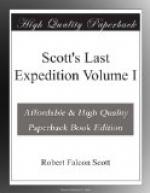’No sooner was some semblance of order restored than some exceptionally heavy wave would tear away the lashing and the work had to be done all over again.’
The night wore on, the sea and wind ever rising, and the ship ever plunging more distractedly; we shortened sail to main topsail and staysail, stopped engines and hove to, but to little purpose. Tales of ponies down came frequently from forward, where Oates and Atkinson laboured through the entire night. Worse was to follow, much worse—a report from the engine-room that the pumps had choked and the water risen over the gratings.
From this moment, about 4 A.M., the engine-room became the centre of interest. The water gained in spite of every effort. Lashley, to his neck in rushing water, stuck gamely to the work of clearing suctions. For a time, with donkey engine and bilge pump sucking, it looked as though the water would be got under; but the hope was short-lived: five minutes of pumping invariably led to the same result—a general choking of the pumps.
The outlook appeared grim. The amount of water which was being made, with the ship so roughly handled, was most uncertain. ’We knew that normally the ship was not making much water, but we also knew that a considerable part of the water washing over the upper deck must be finding its way below; the decks were leaking in streams. The ship was very deeply laden; it did not need the addition of much water to get her water-logged, in which condition anything might have happened.’ The hand pump produced only a dribble, and its suction could not be got at; as the water crept higher it got in contact with the boiler and grew warmer—so hot at last that no one could work at the suctions. Williams had to confess he was beaten and must draw fires. What was to be done? Things for the moment appeared very black. The sea seemed higher than ever; it came over lee rail and poop, a rush of green water; the ship wallowed in it; a great piece of the bulwark carried clean away. The bilge pump is dependent on the main engine. To use the pump it was necessary to go ahead. It was at such times that the heaviest seas swept in over the lee rail; over and over [again] the rail, from the forerigging to the main, was covered by a solid sheet of curling water which swept aft and high on the poop. On one occasion I was waist deep when standing on the rail of the poop.
The scene on deck was devastating, and in the engine-room the water, though really not great in quantity, rushed over the floor plates and frames in a fashion that gave it a fearful significance.
The afterguard were organised in two parties by Evans to work buckets; the men were kept steadily going on the choked hand pumps—this seemed all that could be done for the moment, and what a measure to count as the sole safeguard of the ship from sinking, practically an attempt to bale her out! Yet strange as it may seem the effort has not been wholly fruitless—the string of buckets which has now been kept going for four hours, [1] together with the dribble from the pump, has kept the water under—if anything there is a small decrease.




